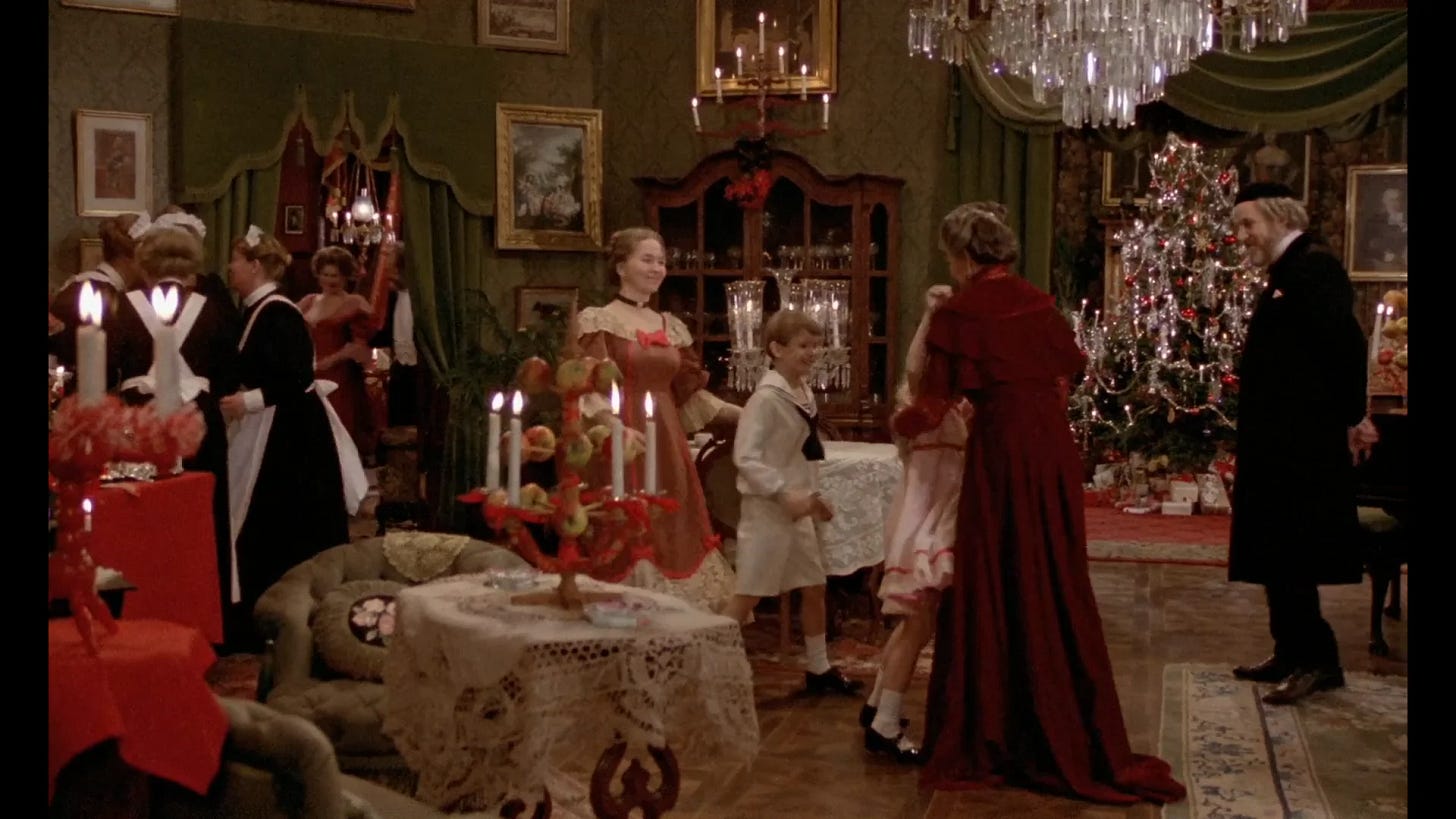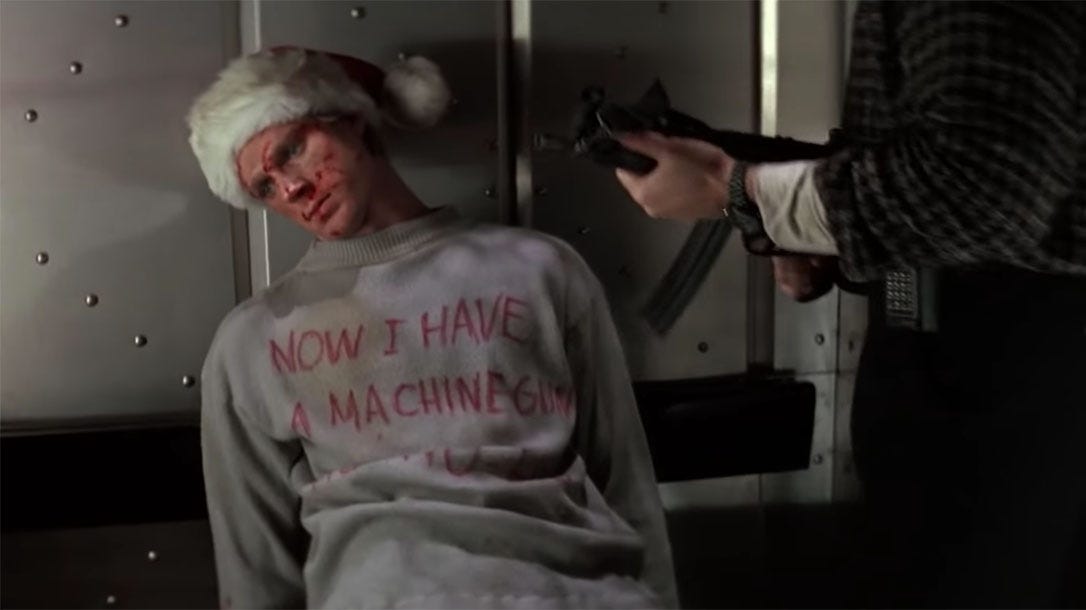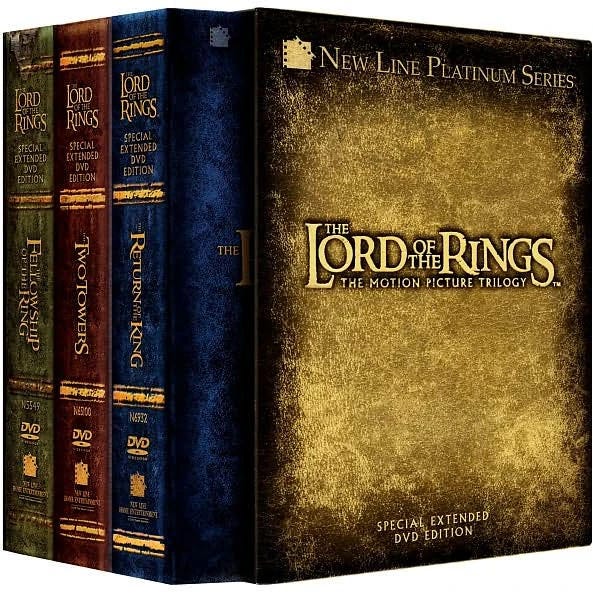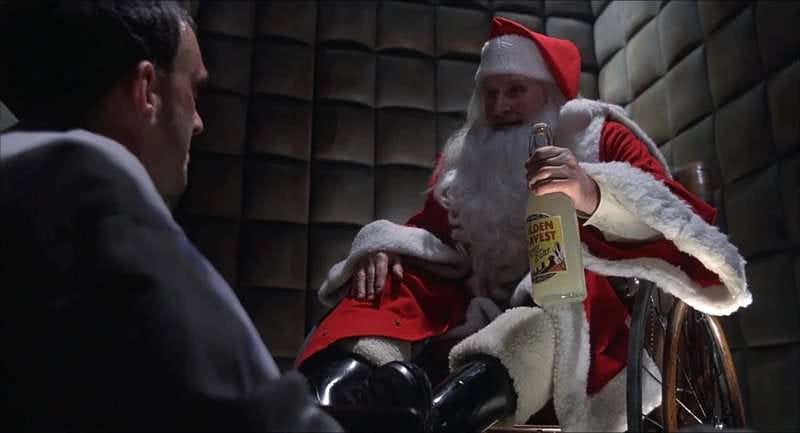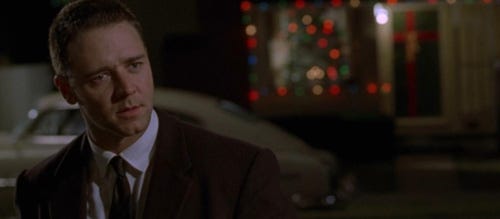The Notes & Errata Alternative Christmas Canon
A Selection of (Mostly) Non-Ubiquitous Holiday Favorites
There’s no shortage of classic Christmas films, and of course one of the great joys of the holiday season is to plant yourself in front of the TV with your family and a boozy drink to watch any number of time-honored favorites - Home Alone, Christmas Vacation, Gremlins. These are movies that everyone can agree on and enjoy. Which is exactly why I wanted to play around the edges a bit and offer some selections that, with one or two exceptions and depending on the company you keep, don’t get mentioned as much this time of year or are certain to rub the wrong way.
Preparatory Offerings: Family Matters
There are few things I feel the need the mention even if they don’t fit my self-imposed parameters. Firstly, Ingmar Bergman’s Fanny and Alexander opens with an extended sequence set on Christmas Eve, in which the opulent party thrown by the Ekdahls sets the stage by introducing us to all the major characters while also provide a joyous presage to the impending struggle and gloom. The movie doesn’t fit here because this is only the first sequence (and, unlike the other movie below that breaks this rule and was included, it has been an admittedly long time - over two decades, my god - since I have watched it).
On the subject of Christmas get-togethers, I must make mention of Thornton Wilder’s The Long Christmas Dinner. A one-act play that strings together 90 years worth of Bayard family Christmas meals into one fluid scene - characters walk out the door and either come back aged many years, or don’t come back at all because they have passed on. We get a century’s worth of development not only of the family but of the country itself; in this way it’s a fairly seminal text that predates not only the Theatre of the Absurd but also Wilder’s later masterpiece Our Town.
Additional Honorable Mentions
The original Black Christmas may get into the regular rotation at some point - that opening credit screen, set over that eerily quiet rendition of silent night, is justification alone - though is also perhaps too obvious. Kiss Kiss Bang Bang would have made this list a decade ago, but it’s been at least that long since I’ve watched it. And while Carol may seem like a great choice, I still haven’t seen it (I know, I know).
On Her Majesty’s Secret Service is a bubble contender here. It’s certainly the Bond Christmas movie (though not the only one, of course), but while the extended gift-getting sequence in Blofeld’s lair or that grating Christmas Tree song feel like egregious exclusions, it’s once again only a small stretch of the film, plus November is Bong season. It’s an every-few-years entry, perhaps. Ah hell, I probably should have included it. You live, you learn.
Prologue: A final word on Die Hard
Let’s set the record straight: Die Hard is, despite what some of the more tiresome contrarians would have us believe, irrefutably a Christmas movie. Beyond the mere fact that it takes place during the holiday season, the film is the story of a grumpy old malcontent who learns the error of his ways and the value of human connection over the course of a one-night ordeal (sound familiar?), it ends with the reunification of a family unit while snow (or in this case, debris from the explosion of a helicopter over the roof of a skyscraper that looks and flutters like snowflakes) falls from the sky, and even features a holly jolly man with a face full of snow.
Christmas is woven into the fabric of the movie just as much if not more so than the window dressing of Lethal Weapon, with its bullet-riddled egg nog and tree lot shootout, which for some reason gets a strange pass from this kind of tedious discourse.
The Lord of the Rings trilogy
These have nothing to do with Christmas on the surface, or even much to do with it below beyond the existence of elves and some tenuous connection regarding the inherent goodness of man, but for three years at the dawn of the millenium these were a cultural event every December. They were all released the second week of the month, right as school was getting out, and after the first film’s success (inseparable from a post-9/11 landscape in which we were still looking for ways to be unified, which morphed later into a need amongst some for succor from the horrors unleashed in the wake of the attacks), this was a three-year cinematic phenomenon. One of the last true monocultural events before the fracturing of audiences by the internet, it felt special that so many of us planned the last month of their year as much around these films as they did their various holiday celebrations. Three years ago marked the 20th anniversary of Fellowship, and that December it felt once again like everybody was watching them.
But you actually have to consider that a 4-year span, because it would have been December of 2005 that the Extended Edition DVD of Return of the King came out. A series of releases as eagerly anticipated as the theatrical films themselves, these sets - with their extended cuts and hours upon hours of exhaustive behind-the-scenes documentaries - were the high point of the DVD era. I got one for Christmas each year they came out, after weeks of pining in jealousy while everyone around me bought their own and dug in, and so deeply associate three years of Christmases with a poring over of all the material these sets had to offer. Much like Thanksgiving is the season of James Bond, Christmas to this day still makes me think of Middle Earth.
Eyes Wide Shut
Like A Christmas Carol, Kubrick’s final film is about a late night otherworldly exploration taken by a well-off man that upends his whole worldview. Yet whereas in Dickens’ novella it is a literal visitation from ghosts, Eyes Wide Shut depicts a more ambiguous traversing of the liminal space between waking life and dream, the external world and the subconscious. Just as Scrooge cannot interact with the events to which he returns or is made privy, Bill Harford can neither make sexual union with any of the women throwing themselves at him after he discovers his wife Alice’s secret desires nor gain entry to the upper-upper-class social strata to which he aspires and which promises in theory to quench his every illicit desire.
A haunting exploration of the notion that the deepest interiority of the people closest to us will forever remain as unknowable a mystery as the true nature of the world we inhabit, the film is nonetheless about the reunification of a marriage and a family; it is about committing to another human despite this unbridgeable gap, and in spite of the insecurities that threaten to tear a relationship apart, which makes it a perfect holiday film on a deeper thematic level beyond the beautifully cozy Christmas-heavy production design and art direction.
Brazil
Even I tend to forget this is a Christmas movie, though the opening arrest of Henry Buttle - wrongfully sought by the authorities because a dead fly fell into an automated typewriter and caused his name to be stamped on a warrant instead of the subversive commando Henry Tuttle (Robert DeNiro in what was at the time an uncharacteristically small supporting role) -transpires while his family sits around the tree. But the whole movie takes place during the immediate aftermath of the arrest over the remainder of the Christmas holiday. The intricacies of the corrupt and beaurocratic government machinations that destroy not only Buttle but Sam Lowry as he tries to get to the heart of the mix-up play out among scenes of perfunctory gift exchanges and the trappings of holiday ritual in a way that feels distinctly English - the facade of civilization hiding the ways that the systems we build to protect us can become perverted into a machinery that grinds us into willingly submissive pawns before destroying us.
LA Confidential
This really only applies to the first half hour or so - after the Bloody Christmas headline hits the screen you can finish watching or simply turn it off, leave out the cookies, and come back to it in the new year. While the first proper scene we get in the film involves Russell Crowe’s Bud White ripping Christmas decorations off of a roof to draw out an abusive alcoholic, sometimes it’s just a single moment that truly resonates - in this case, a later scene in which Crowe meets Kim Basinger in the liquor store, with Bing Crosby singing Mele Kalikimaka over the radio. I’ve written here before about the deep association between alcohol and the Holiday season, and maybe that’s why this scene in particular stands out (ditto the ensuing image of Dick Stensland pouring two entire bottles of hooch into a serving bowl of egg nog), though the background action in a later scene of James Cromwell leading a line of drunken cops in a rendition of Silent Night isn’t too bad either.
Less evocative of the intended spirit of Christmas is the resolution of this first chunk of the film, in which the LAPD en masse beats the shit out of a group of falsely arrested immigrants, though this attack is a purposefully grim juxtaposition against the festive holiday context that gets us uncomfortably closer to the rot at the center of American life - mainly our illusions about the notion of law and order and where the police actually stand in relation to those ideals - that the film so wonderfully explores.
Placido
The oldest entry on this list and yet the newest to me. I first viewed this film last year; I was working through the filmography of Luis García Berlanga, who directed and co-write the film. Placido is a delightfully cacophonous dark comedy about a town that every year stages a charity event for Christmas in which the well-off families each take in one of the less fortunate for Christmas dinner. The proceedings are of course documented by a constantly broadcasting radio announcer, and are dovetailed with the attempts of the titular character, a driver employed for the festivities, to deliver a down payment before the midnight deadline on the vehicle he has just purchased, or else it will be impounded. The struggle of Placido, who lives in a public restroom with his family, sums up one half of the film’s satirical commentary excellently - he is prevented from making the payment that will ensure continued ownership of the vehicle he uses to make a living because he is unable to get a break from the job for which he requires it. The other half builds to and gains full expression during an extended sequence in which one of the adopted poor suffers a heart attack at his dinner, and the town celebrants engage in an increasingly complicated series of efforts to get him back into the possession of the woman with whom they believe he is in a relationship so that they can be married before he expires. This culminates in her being left alone with the corpse in her hovel on Christmas Eve while everyone else - including Placido, who has finally gotten what he needs - goes back to their lives, their one act of charity done for the year. The film is an important reminder that so-called Christian morality is more often than not - especially when government mandated - about the self-edification of those who want to feel as if they are demonstrating it than it is about actually helping or serving those in need or less fortunate.
I summed up the film as follows on my Letterboxd account after I first watched it:
In so many ways a film that I’ve always been searching for - an anxiety-ridden (and -inducing) comedy told practically in a single breath, escalating in cacophony and absurdity the whole way through. Biting social commentary that is actually funny and incisive. Desperate, put-upon strivers and/or idiots all talking over each other at any given moment; simple tasks rendered Sisyphean by arbitrary bureaucracy; social and religious hypocrisy; an understanding of how class systems perpetuate inequality down through their ranks - everyone finding someone below them to exploit, distrust, or ignore - as well as a portrayal of humanity that recognizes it as flawed, messy, and ridiculous rather than inherently altruistic. A canonical text.
Berlanga spent the majority of his career pulling off a series of miraculous feats: releasing movies in Franco’s Spain that were sharply critical of a ruling facist regime that was not shy about censoring - and even executing - artists that they deemed undesirable. As much as Placido can be seen as a cross-section of a nation in decay, the holiday used as a larger metaphor for the sheen placed atop corruption and hypocrisy, Berlanga’s career can perhaps be seen as a beacon as we move beyond the temporary balm of this current holiday season and into the dark years that lie ahead.
-cs




